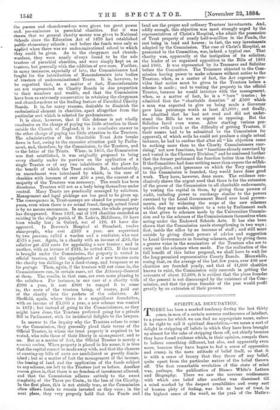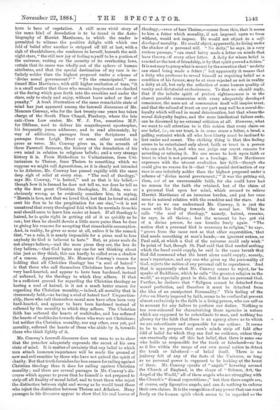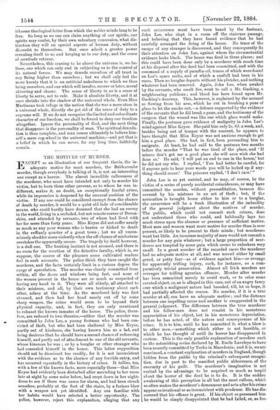SPIRITUAL DENUDATION. T HERE has been a marked tendency during the
last thirty years, in men of a certain nervous restlessness of intellect, to a process for which we can find no appropriate name, unless it be right to call it spiritual denudation,—we mean a sort of delight in stripping off beliefs in which they have been brought up almost for the sake of stripping them off, not chiefly because they have found evidence which, in their opinion, compels them to believe something different, but also, and apparently even more, because they have began to feel a sense of oppression and cramp in the mere attitude of belief itself, so that it is with a sense of luxury that they throw off any belief, quite apart from the particular nature of the belief thrown off. The first remarkable revelation of this state of mind was, perhaps, the publication of Blanco White's Letters and Biography. There we saw the nervous restlessness with which one belief after another was dismissed till a mind marked by the deepest sensibilities and every sort of human piety of feeling, was left as bare of trust, in the highest sense of the word, as the peak of the Matter-
horn is bare of vegetation. A still more vivid story of the same kind of denudation is to be found in the Auto- biography of Harriet Martineau, in which the reader is permitted to witness the positive delight with which one fold of belief after another is stripped off till at last, with a sigh of thankfulness, she confesses to herself, beneath the mid- night stars, " the still new joy of feeling myself to be a portion of the universe, resting on the security of its everlasting laws, certain that its cause was wholly out of the sphere of human attributes, and that the special destination of my race is in- finitely nobler than the highest proposed under a scheme of divine moral government ?' " "To the emancipated," con- tinued Miss Martineau, with still higher exaltation of tone, "it is a small matter that those who remain imprisoned are shocked at the daring which goes forth into the sunshine and under the stars, only to study and enjoy, without leave asked or fear of penalty." A fresh illustration of the same remarkable state of mind has just appeared among the farewell discourses of Mr. Moncure Conway, who for the last twenty-one years has taken charge of the South Place Chapel, Finsbury, where the late anti-Corn Law orator, Mr. W. J. Fox, sometime M.P. for Oldham, used to deliver his magniloquent apostrophes, his frequently jocose addresses, and to read alternately, by way of edification, passages from the Scriptures and passages from Leigh Hunt or some other moralist in prose or verse. Mr. Conway gives us, in the seventh of these Farewell Sermons, the history of the denudation of his own mind in relation to religions beliefs ; and a very strange history it is. From Methodism to Unitarianism, from Uni- tarianism to Theism, from Theism to something which we -suppose we might call Agnosticism, as it is clearly not intended to be Atheism, Mr. Conway has passed rapidly with the same deep sigh of relief at every step. "The soul of theology," says Mr. Conway, "is hatred," and as that is his belief,— though how it is formed he does not tell us, nor does he tell us why the first great Christian theologian, St. John, was so obviously wrong, as he evidently considers him, in saying, "Herein is love, not that we loved God, but that he loved us, and sent his Son to be the propitiation for our sins,"—it is not unnatural that every theological fold which he unwinds from his soul should seem to leave him easier at heart. If all theology is hatred, he is quite right in getting rid of it as quickly as he can; but then he should devote a little more pains than he does to giving his reasons for accepting that remarkable assumption. And, in reality, he gives us none at all, unless it be the remark that, "as a rule, it is nearly impossible for a pious soul to love anybody its God is believed to hate." But, as pious souls do not always believe,—and the more pious they are, the less do they believe,—that God hates any one for not thinking about him just as they think, this can hardly be called even a shadow of a reason. Apparently, Mr. Moncure Conway's reason for holding that all Christian theology has "a soul of hatred" is that those who call themselves Christians have often been very hard-hearted, and appear to have been hardened, instead of softened, by the theology to which they adhere. If that be a sufficient ground for regarding the Christian theology as having a soul of hatred, is it not a much better reason for regarding the Christian morality,,—indeed, all morality that is strenuously held,—as having a soul of hatred too ? Unquestion- ably, those who call themselves moral men have often been very hard-hearted, and appear to have been hardened instead of softened by the morality to which they adhere. The Christian faith has softened the hearts of multitudes, and has softened the hearts of multitudes towards those who were not Christians; but neither the Christian morality, nor any other, ever yet, qui morality, softened the hearts of those who abide by it, towards those who think lightly of it.
Mr. Conway's farewell discourse does not seem to us to show that the preacher adequately expounds the secret of his own state of mind. It is matter of certainty that any belief to which men attach immense importance will be made the ground of new and evil enmities by those who have not gained the spirit of charity. Bat that truth furnishes far less reason for railing against Christian theology than it does for railing against Christian morality ; and there are several passages in Mr. Conway's dis- course which appear to prove that he himself is not prepared to strip off all finality of moral belief, and to treat those who reject the distinction between right and wrong as be would treat those who reject the distinction between Theism and Atheism. Many passages in his discourse appear to show that his real horror of
theology,—even of bare Theism,—comes from this, that it seems to him a fetter which morality, if not imposed .upon us from without, would not impose. He would not object to a self- developed morality. He would object, apparently, toliving under the shadow of a personal will. "No deity," he says, in.a very curious passage, "can stand being made a fetter on minds that have thrown off every other fetter. A deity for whom belief is exacted as the teat of friendship, is by that spirit proved a fiction." It is not easy to grasp what is meant by the assertion that no deity can stand being made a fetter ;" but apparently it means that a deity who professes to reveal himself as requiring belief as a condition of his favour, may be at once rejected as not in reality a deity at all, but only the reflection of some human quality of vanity and dictatorial exclusiveness. To that we should reply, that if the infinite spirit of perfect righteousness is in the closest possible communion with every adequately .developed conscience, the mere act of communion itself will inspire trust, and that the refusal of trust on our part may well be a moral dis- loyalty which will end in moral deterioration, bat that where the moral disloyalty begins, and the mere intellectual failure erids, can be discerned by no external criticism at all. However, what we want to call attention to is this notion that every claim on our belief, i.e., on our trust, is in some sense a fetter, a bond, a galling restraint which all who love liberty must be inclined to fret under and resent. The striking thing is that this feeling seems to be entertained only about faith or trust in a person who can ask for it, and who can judge our secret reasons for according or refusing it. No one seems to look upon faith or trust in what is not personal as a bondage. Miss Martineau expresses with the utmost exultation her faith—though .ehe could give no reason for it—that "the special destination of my race is one infinitely nobler than the highest proposed mider a scheme of divine moral government;' "it was the getting rid, then, not of an unreasonable faith, for she could have had no reason for the faith she retained, but of the Claim of a personal God upon her mind, which seemed to relieve Harriet Martineau of an immense burden, and pat her once more in natural relation with the sunshine and the stars. And so far as we can understand Mr. Conway, it is just the same with his feeling towards the moral law. Whet " he calls "the soul of theology," namely, hatred, remains, he says, in all theism ; but the moment he has got rid of a divine person, be can breathe freely again. "The notion that a personal God is necessary to religion," he says, "grows from the same root as that other superstition, that God needs something at man's hands,—an ignoratt notion, as Paul said, at which a God of the universe could only wink." In point of fact, though St. Paul said that God needed nothing which the hand could supply, he said in the same breath that God did command what the heart alone could supply, namely, man's repentance, and any one who gives up the personality of God, rejects the notion of any personal call to repentance. 'And that is apparently what Mr. Conway means to reject, for-he speaks of Buddhism, which he calls "the greatest religion in the world," as especially great in this, that it has no personal God. Further, he declares that "Religion cannot be detached' from moral perfection, and therefore it must be detached from the idea of an omnipotent Personality." This feeling of the fetter on liberty imposed by faith, seems to be confined at present almost exclusively to the faith in a living person, who can call us to account for any failure to perform our duties. Nothingie too rose-coloured for characterising those agencies in nature which are supposed to be subordinate to man, and nothing too gloomy for the faith that there is an agency above ne to Niihieh we are subordinate and responsible for our actions. It seems to be to no purpose that men's minds • strip off fold lifter fold of belief for which they can find no evidence, ualess they can eventually strip off this last belief, that there is some one who holds us responsible for the truth or falsehood—so far as it lies within the range of our own moral action to detect the truth or falsehood — of belief itself. There is no jealousy felt of any of the facts of the Universe, so long as no personal power is supposed to be lurking at the heart of them. Mr. Conway speaks of " angels " hovering around the Church of England, in the shape of " Science, 'Art; the Angel of the World," all of them angels who arc struggling with the Church's "dismal superstitions ;" but then these angels are, of course, only figurative angels, and can do nothing to enforce their own claims. It is the recognition of any power that can react freely on the human spirit which seems to be regarded as the
irksome theological fetter from which the nobler minds long to be free. So long as no one can claim anything of our spirits, our spirits may confer, by their own voluntary concession, what dis- tinction they will on special aspects of human duty, without discredit to themselves. But once admit a greater power revealing itself to us and keeping us to our duty, and the sense of servitude returns.
Nevertheless, this craving to be above the universe is, we be- lieve, one which can only end in subjecting us to the control of its natural forces. We may denude ourselves of all trust in any Being higher than ourselves ; but we shall only feel the more keenly that it is an artificial nakedness to which we thus bring ourselves, and one which will involve, sooner or later, moral shivering and shame. The sense of liberty in us is a sense of liberty to serve, not to rule. Make it absolute liberty, and it at once shrinks into the shadow of the universal whole. Even Miss Martineau took refuge in the notion that she was a mere atom in a universal whole, directly she got rid of the sense of duty to a supreme will. If we do not recognise the limited and subordinate character of our freedom, we shall be forced to deny our freedom altogether. Ignore the personality of God, and the next thing that disappears is the personality of man. The spiritual denuda- ticrn is thus complete, and man comes ultimately to believe him- self a mere cog-wheel in the universal machine,—and yet that is a belief in which he can never, for any long time, faithfully remain.




































 Previous page
Previous page